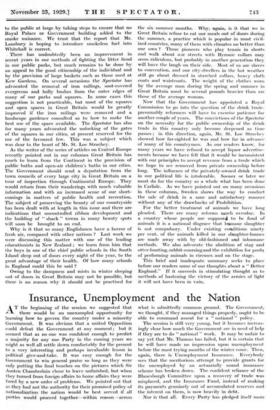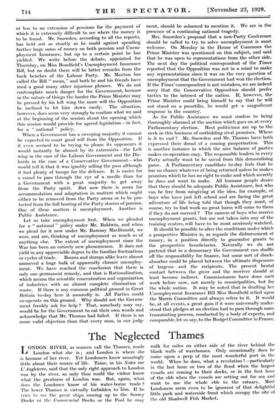Insurance, Unemployment and the Nation
AT the beginning of the session we suggested that there would be an unexampled opportunity for learning how to govern the country under a minority Government. It was obvious that a united Opposition could defeat the Government at any moment; but it seemed that as no one was confident enough to predict a majority for any one Party in the coming years we might as well all settle down comfortably for the preSent to a very interesting and perhaps invaluable lesson in political give-and-take. It was easy enough for the Government to win general praise so long as they were only putting the final touches on the pictures which Sir Austen Chamberlain chose" to leave Unfinished; but when they turned from foreign affairs to hothe affairs they were faced by a new order of problems. We pointed out that as they had not The authority for their promised policy of nationalization- the nation would be best served if all parties would proeeed togethei=Viithiii reason—aeross what is admittedly common ground. The Government, we thought, if they managed things properly, ought to be able to command assent for a " national " policy.
The session is still very young, but it becomes increas- ingly clear how much the Government are in need of help if they are to do " national " work. It may be unfair to say yet that Mr. Thomas has failed, but it is certain that he will have made no impression upon unemployment before the most trying months of the winter come. Then, again, there is Unemployment Insurance. Everybody sees that the meritorious attempt to provide grants for the unemployed by an actuarially sound insurance scheme has broken down. The confident reliance of the Blanesburgh Committee upon a recovery of trade was misplaced, and the Insurance Fund, instead of making its payments genuinely out of accumulated reserves and the interest on them, is now heavily in debt Nor is that alb -Every -Party has pledged itself more or less to an extension of pensions for the payment of which it is extremely difficult to see where the money is to be found. Mr. Snowden, according to all the reports, has held out as stoutly as he could against spending further large sums of money on both pension and Unem- ployment Insurance, but up to a certain point he has yielded. We write before the debate, appointed for Thursday, on Miss Bondfield's Unemployment Insurance Bill, but no doubt there will be bitter remarks from the back benches of the Labour Party. Mr. Maxton has called the Bill " mean," and both he and his friends have used a good many other injurious phrases. We do not contemplate much danger for the Government, because in the nature of things the harder the Prime Minister may be pressed by his left wing the more will the Opposition be inclined to let him down easily. The situation, however, does seem very strongly to confirm what we said at the beginning of the session about the opening which this session would provide for agreed legislation—in fact, for a " national " policy.
When a Government has a sweeping majority it cannot be expected to court good will from the Opposition. If it even seemed to be trying to please its opponents it would instantly be abused by its extremists—the Left wing in the case of the Labour Government and the Die- hards in the case of a Conservative Government—who would tell it that it was ignobly selling the pass although it had plenty of troops for the defence. It is easier for a camel to pass through the eye of a needle than for a Government with a great majority to get away from the Party spirit. But now there is room for accommodation and adaptation in matters which ought either to be removed from the Party arena or to be pro- tected from the full beating of the Party storms of passion. One of these matters is unemployment. Another is Public Assistance.
Let us take unemployment first. When we pleaded for a " national " policy under Mr. Baldwin, and when: we plead for it now under Mr. Ramsay MacDonald, we were, and are, thinking of unemployment as much as of anything else. The extent of unemployment since the War has been an entirely new phenomenon. It does not yield in any appreciable degree to the familiar fluctuations or cycles of trade. .Booms and slumps alike leave almost unmoved a huge bulk of apparently chronic unemploy- ment. We have reached the conclusion that there is only one permanent remedy, and that is Rationalization, which means the scientific concentration and organization of industries with an almost complete elimination of waste. If there is any common political ground in Great Britain to-day here it assuredly is. All Parties could co-operate on this ground. Why should not the Govern- ment frankly ask for help ? That, somebody may say, would be for the Government to eat their own words and acknowledge that Mr. Thomas had failed. If there is no more valid objection than that every man, in our judg- ment, should be ashamed to mention it. We are in the presence of a continuing national tragedy.
. Mrs. Snowden's proposal that a non-Party Conference should be called to try to solve unemployment is most welcome. On Monday in the House of Commons the Prime Minister was questioned on this subject, and said that he was open to representations from the other side. The next day the political correspondent of the Times reported that the Opposition was not in a mind to make any representations since it was on the very question of unemployment that the Government had won the election: If the Times' correspondent is not mistaken, we are indeed sorry that the. Conservative Opposition should prefer tactics to the interest of the nation. If, however, the Prime Minister could bring himself to say that he will not stand on a punctilio, he would get a magnificent response in the country.
As for Public Assistance we must confess to being thoroughly alarmed at the auction which goes on at every Parliamentary election. Most politicians are up to the neck in this business of outbidding rival promises. Where is it to end ? Mr. Snowden and Mr. Thomas have both expressed their dread of a coining pauperization. This is another instance in which the nice balance of parties makes co-operation easy. The responsible leaders in every Party actually want to be saved from this demoralizing game. A Parliamentary candidate to-day feels that he has no chance whatever of being returned unless he makes promises which he has no right to make and which secretly he does not want to make. All humane people desire that there should be adequate Public Assistance, but who can be free from misgiving at the idea, for example, of boys who have just left school and are facing the great adventure of life being told that though they must, of course, try to find work no great harm will come to them if they do not succeed ? The careers of boys who receive unemployment grants, but are not taken into any of the training centres, will have to be most anxiously watched.
It should be possible to alter the conditions under which a prospective Minister is, as regards the disbursement of money, in a position directly to guarantee grants to the prospective beneficiaries. Naturally we do not pretend that in a democracy the Government can shuffle off the responsibility for finance, but some sort of shock- absorber could be placed between the ultimate dispensers of largesse and the recipients. The present brutal contact between the giver and the receiver should at least become indirect. Commissioners have done such work before now, not merely in municipalities, but for the whole nation. It may be noted that in drafting her Unemployment Insurance Bill Miss Bondfield relied upon the Morris Committee and always refers to it. It would be, at all events, a great gain if it were universally under- stood that pledges at an election had to pass through some transmuting process, conducted by a body of experts, and comparable, let us say, to the Budget Committee in France.































































 Previous page
Previous page